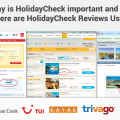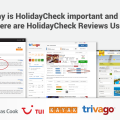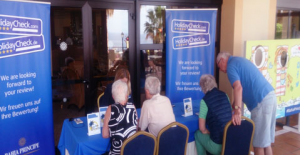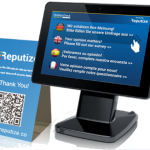This article is PART 2 of a block of articles called Tips & Tricks on Selling Your Hotel on the German Holiday Market aiming to demystify the process of getting your tourism product to the German customer. It is presented in an easy to read style to try to provide insight and clear up some confusions about the German outbound holiday market as well as advice on how to sell better. It is separated over three sections and presents an overview of:
– PART 1: The specifics of the German holiday travel market
– PART 2: Insight into the tour operators’ business
– PART 3: Strategies for success on the German outbound holiday market
Strategies for Success on the German Outbound Holiday Market
Your reputation on the German market – the power of guest reviews
- Guest reviews. Why is HolidayCheck important?
HolidayCheck is the most visited and trusted travel portal in the German-speaking countries where users can easily find and book their perfect holiday and share their holiday experience. Being a meta-search and travel agent by itself HolidayCheck provides its reviews to almost all major German tour-operators – here are examples:


So if you were a German holiday buyer it is very likely you will base your buying decision on reviews and ranking provided by HolidayCheck, even though you may not even realize it.
- Strategies to engage guests and get more reviews:
1.) Ask your guests to write a review on HolidayCheck when they return home.
Give a small gift during checkout or send a thank you email with a kind request for reviewing your hotel. In turn, worth mentioning, HolidayCheck motivates the users for writing a review with a €100 or €50 discount voucher on a next purchase. Additionally review writers can requests loyalty awards including 200 miles from AirBerlin’s TobBonus, 150 miles from Lufthansa’s Miles & More and 100 miles from Eurowings Boomerang Club (as of March 2017).
Email sending can be automated with an automatic integration between the reputation platform and your PMS.
2.) Make it easy for guests to write a review during their stay.
Two options exist – the so-called “HolidayCheck Day” and touch-screen terminals.
You can arrange a special event – usually called “HolidayCheck Day” at your hotel where you can use iPads and PCs to invite guests to write  a review. This event requires a special arrangement – you need to announce the event in advance and possibly thank your guests with a little gift (cocktail, fruit basket, raffle, room upgrade, etc). A “HolidayCheck Day” is only available under a special arrangement with HolidayCheck.
a review. This event requires a special arrangement – you need to announce the event in advance and possibly thank your guests with a little gift (cocktail, fruit basket, raffle, room upgrade, etc). A “HolidayCheck Day” is only available under a special arrangement with HolidayCheck.
To collect reviews at all times while the guests are still at your  property you can place Reputize-certified touch-screen terminals.
property you can place Reputize-certified touch-screen terminals.
Review writing happens on the touch-screen terminals (tablet kiosks) that are locked for the review application and which can be left unattended in various places around the hotel. As a reference, on average, Reputize customers using this option are able to generate twice as many reviews. >> click here for customer cases
You can get more insight by reading our blog article “Disruption in the Hospitality Industry – 3 New Ways to Engage Guests and Collect Reviews“.
Differentiate and better communicate your product and sales message
If you are new on the market, unless your product is truly unique, don’t bother asking for your offer to be included in printed catalogs – these spots are reserved for those with proven conversion rates. Your offer will be included in the web portal and to pick up sales and start converting you need to define a clear value proposition that stands out. You know best your advantages over your competition – so make sure you point them out loud and clear. Germans like simple, clear details and they like choice. A menu of options or itinerary examples rather than very strictly prescribed bundles will be effective. Try to create a story about the experience in your hotel – storytelling is a strong sale strategy in hospitality. For example a story can be hidden behind a single picture that describes best your hotel.
Set up a pricing strategy
The tour operator plans and prices his holiday packages well in advance of the holiday season, usually during the summer / early autumn when he enters into contracts with hotels, car hire firms, coach operators, visitor attractions and airlines for the following season. The brochure or website are usually available in the market around October/ November/December. Note: this timing varies slightly from market to market. Germans are not really last minute bookers; 65% decide their holiday destination 6 months before their trip. Decision making is done early in the year with January and February the key booking time for holidays. Time your promotions and sales to coincide with that.
Tour operators always look for keen net rates (all inclusive B&B or D/B/B {dinner, bed and breakfast}) to cover the costs of print, distribution, promotion, travel agent commission etc. You can adjust your rates according to the volume of business expected. Big volume operators will expect much keener rates than lower volume operators.
Although rates vary, market-based tour operators will generally expect a net price of about 20-30% less than your normal price to cover their costs and margin. Again, there are no hard and fast rules; negotiation on prices is a key part of working with the tour operator and the price you quote should depend on the likely level of business you will do with the tour operator.
Try to work towards a long-term relationship; cut rates or short-term introductory offers are of little value in the long-term.
As usually happens in business there are tradeoffs in negotiating the sale terms with a tour operator. Here they are:
- Higher retail price => less conversion with buyers
Giving a final price relatively high compared to your competitors will result in your offer being outperformed by your competitors and will overall drive less revenue. And don’t be mistaken – nowadays your competitors are not only the same range hotels in your area, but these could also be hotels located hundreds of kilometers away and even these on the other side of the world. Travelers are looking for experiences at the right price and if your price is higher than comparable experiences they will move along. Furthermore lower conversion will automatically trigger lower visibility on the booking portals, as this is part of the ranking algorithm.
- Lower commission – less visibility
Fair enough, tour operators will be more willing to promote those offers giving them more profit. While this is a general rule, its important to note that sometimes better converting offers, even at a lower price level, but the ones driving more sales, will bring eventually more profit for the tour-operator. So if your hotel converts well you can consider lowering the commission.
Contractual clauses to watch out for
Tour operators are always covered by complicated contracts. Read carefully the agreement, look for fine-prints and question with a lawyer every article you are not sure what it means. Here are few things to watch out for:
- Selling additional services
In many cases selling services like city-tours, attraction tickets, rent-a-car, eating-out, etc., will be a tricky business after you start working with a German tour operator. A tour operator would generally assume that they have the only right to sell services to their clients – and they will try to have this controversial clause written down in the contract. From the day of accepting the first clients of the tour operator be prepared that you will be treated only as a bed-and-food provider. The operators will place their ads in the most visible places in your hotel and their reps will visit you a few times a week to “check how things are going” but more importantly to sell additional services. If you try to sell to your guests whatever falls into the tour operators’ field of interest – be prepared to have a not-so-nice conversation at first, and if you still persist, some nasty kicks under the table. For this reason many hoteliers (I have personally talked to) have confirmed they are literally afraid to engage into advertising and selling additional services. - Penalties
Tour operators do insist on contractual penalties and be prepared that these will actually be enforced.
Typically a neglected penalty is the one which will take care of the cases when you would not be able to maintain the promised quality of product. And most often German tour operators measure quality by (guess what?) your hotel’s rating in HolidayCheck.de! This is one of the reasons why it is important to monitor and to build on your hotel’s reputation on HolidayCheck (refer to the article above “Why HolidayCheck is important?”).
Another example for you being in risk of paying damages is if the tour operator receives many customer complaints. Be prepared that guests are willing and eager to complain not to your staff but rather to the tour operator because they are likely to receive hefty cash reimbursements. And those will come out of your own pocket! Recently Thomas Cook introduced a 24-hour hotel satisfaction promise across 1,600 hotels, committing to resolve any problems thier customers may have, on arrival at their hotel, within 24 hours. And this is an expensive service – someone has to pay for. For this reason it is important not to rely on external quality control processes and systems but to have in place your very own one. You should enforce processes so that your staff is the first to know when there is a problem. The good news is that such systems are now very affordable and easy to install – here is the best example of an internal hotel guest survey/communication platform I know – Reputize surveys.
- Overselling
In order to guarantee better occupancy many hotels contract more room-nights than they actually have available. This is called “overselling”. It’s a tricky game to play and you can win a lot if you know what you are doing. Overselling may help you fill in all those empty rooms off-season but the problem happens when you get a guest at the door and no room-key for him. If you are not prepared for this scenario you are in a trouble – you will own big penalties to the tour operator. The best way prepare is to have a non-binding contract with an adjacent hotel, of the same or better standard, where the guests will be happily accommodated.
This article is PART 2 of a block of articles called Tips & Tricks on Selling Your Hotel on the German Holiday Market aiming to demystify the process of getting your tourism product to the German customer. It is presented in an easy to read style to try to provide insight and clear up some confusions about the German outbound holiday market as well as advice on how to sell better. It is separated over three sections and presents an overview of:
– PART 1: The specifics of the German holiday travel market
– PART 2: Insight into the tour operators’ business
– PART 3: Strategies for success on the German outbound holiday market

